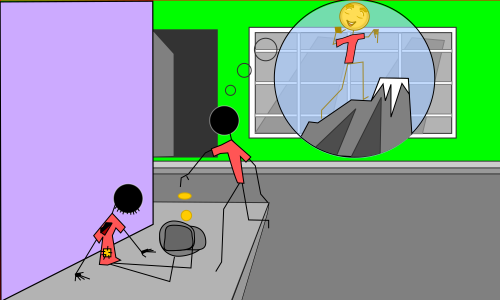
According to Wikipedia
Downward social comparison is a defensive tendency that is used as a means of self-evaluation. When a person looks to another individual or group that they consider to be worse off than themselves in order to feel better about their self or personal situation, they are making a downward social comparison.
wikipedia Social comparison theoryWikipedia, the free encyclopedia WEBversion 01:59, 21 August 2020
Downward Social Comparison
People want to know themselves. Swamis and gurus love this thing. I checked back with wikipedia on a citation that I have for know thyself.
The Ancient Greek aphorism "know thyself" (Greek: γνῶθι σεαυτόν, transliterated: gnōthi seauton; also ... σαυτόν … sauton with the ε contracted), is one of the Delphic maxims and was the first of three maxims inscribed in the pronaos (forecourt) of the Temple of Apollo at Delphi according to the Greek writer Pausanias (10.24.1). The two maxims that followed "know thyself" were "nothing to excess" and "surety brings ruin". In Latin the phrase, "know thyself," is given as nosce te ipsum or temet nosce.Wikipedia Know thyselfWikipedia, the free encyclopedia WEBversion 13:04, 18 September 2020
Actually this concept of trying to get to know ones self is a red herring drawn by Satan to misdirect mankind from pursuing what we really should. Nevertheless we find it to be a touching lament.
KNOW THEN THYSELF
by Alexander Pope
Know then thyself, presume not God to scan
The proper study of mankind is man.
Placed on this isthmus of a middle state,
A being darkly wise, and rudely great:
With too much knowledge for the sceptic side,
With too much weakness for the stoic's pride,
He hangs between; in doubt to act, or rest;
In doubt to deem himself a God, or beast;
In doubt his mind and body to prefer;
Born but to die, and reas'ning but to err;
Alike in ignorance,his reason such,
Whether he thinks to little, or too much;
Chaos of thought and passion, all confus'd;
Still by himself, abus'd or disabus'd;
Created half to rise and half to fall;
Great lord of all things, yet a prey to all,
Sole judge of truth, in endless error hurl'd;
The glory, jest and riddle of the world.
God tells us who and what we are. We can read it in Hebrews 2 but I will only use a sample
He also tells us what we should be striving for
We cannot settle for anything less than perfect and we do not have to look down on others to feel good about ourselves. There is a better way. Look to Christ and His example because the hope and the reward is far greater that anything in the current age of man.
Philippians 2:3-11 KJV Let nothing be done through strife or vainglory; but in lowliness of mind let each esteem other better than themselves. 4 Look not every man on his own things, but every man also on the things of others. 5 Let this mind be in you, which was also in Christ Jesus: 6 Who, being in the form of God, thought it not robbery to be equal with God: 7 But made himself of no reputation, and took upon him the form of a servant, and was made in the likeness of men: 8 And being found in fashion as a man, he humbled himself, and became obedient unto death, even the death of the cross. 9 Wherefore God also hath highly exalted him, and given him a name which is above every name: 10 That at the name of Jesus every knee should bow, of things in heaven, and things in earth, and things under the earth; 11 And that every tongue should confess that Jesus Christ is Lord, to the glory of God the Father.
So God (Christ) calls us brothers in Hebrews 2 and friends in John and expects us to strive to maintain minds free of the complicated selfish reasoning of the world and to be perfect and live in unity with the brethren and in peace with the world.
We are encouraged to keep checking ourselves for improvement, not to compare ourselves to feel we are better than anyone else. The only thing we need to know about ourselves is that we are keeping the faith.
and striving to reach our potential
But to achieve that we should be comparing ourselves to Christ and that should be done in a constructive way, glorifying Him.
We should not have time to waste comparing ourselves with people. In these cases our assessment is often used maliciously or stupidly to create a false sense of wellbeing. Whether the person is better or worse than we are does no make is any better to the one who has to judge.
Social Comparison Theory
My comments captioned
Social Comparison Theoryare adapted from an article that I read several years ago that has since been deleted with reference
08:43, 12 November 2016 Doug (Talk | contribs) deleted. The original reference was
psychwiki Social Comparison Theorypsychwiki.com WEB19 February 2011
Leon Festinger published his original paper on the theory of social comparison in 1954 in the journal Human Relations.
According to this theory humans possess a drive for self-evaluation.
An upward comparison occurs when an individual compares him/herself to someone who is better off (Baumeister, 2008). Given the choice, people prefer making upward rather than downward comparisons (Wills, 1981).
A downward comparison occurs when an individual compares him/herself to someone who is worse off in their estimation (Baumeister, 2008).
This type of comparison generally makes one feel better about him/herself (Martin, 2001). People with low self-esteem are more likely to make downward comparisons (Wills, 1981).
Downward comparisons can either have negative or positive effects on individuals. For example, patients better dealt with the threat of breast cancer when they compared their cases with those of people who had more severe cases (Gibbons, 2005).
On the other hand students who tended to engage in downward comparisons during the beginning of the semester have done significantly worse academically by the end of the semester than students who engaged in upward comparisons (Gibbons, 2005).
Two types of downward comparisons have been defined. A passive downward comparison occurs when an individual takes advantage of a preexisting situation and makes a comparison (Wills, 1981). For example, cancer patients comparing themselves to worse off cancer patients is an example of a passive downward comparison. They did not give the other patients cancer.
An active downward comparison occurs either through derogation or actively causing harm to others (Wills, 1981). Derogation occurs when an individual belittles the target of his/her comparison, with or without that targets knowledge. By actively causing harm to others, individuals create situations in which others will be worse off then themselves, thus presenting them the opportunity to make downward comparisons (Wills, 1981).
{End of Adaptation}
So people like to gather information about ourselves by comparing ourselves with others. This may be no problem in itself but we can fool ourselves by how we interpret that information. If we refer back to Luke 18:10-14 (quoted at the beginning) we find that it was the interpretation of the comparison that did the Pharisee most harm. In any case God warns us that this practice is not wise.
II Corinthians 10:12 [KJV] For we dare not make ourselves of the number, or compare ourselves with some that commend themselves: but they measuring themselves by themselves, and comparing themselves among themselves, are not wise.
I cried because I had no shoes, until I met a man who had no feet
Author Unknown.
It is fine to look at how far we are from the bottom. This could give us confidence in what we have accomplished or at least how much of a buffer we have between us and our worst case. This is fair but we also need to look ahead to see how much farther we have to go. Staying focused on where we have to go motivates us to do better while staying focused on what is behind may cause us to relax too much (i.e. the classic tortoise and hare story). From a spiritual point of view, counting our blessings should teach us to be grateful not proud. It should motivate us to thank and praise God. Looking ahead should help us to recognise how much we need God because without His help (preserving our health, giving us inspiration, preserving our financial state, controlling our burdens etc.) we will fail to reach the top. We need to do a true assessment by looking back and forward.
Charles C. Noble was an American Major General and engineer who worked on the Manhattan Project, developed the early American ICBM program and was the chief Engineer in the Vietnam War. He said, The surest way to be deceived is to consider oneself cleverer than others
.
But we would usually prefer to feed our egos. We like to feel superior to others
We also draw some illogical information from our comparisons. We can look down on the aged, or people who did not go to university, or because of their occupation and so on. By looking down we are saying that we are better but that may in fact not be the case.
A proud man is always looking down on things and people; and, of course, as long as you're looking down, you can't see something that's above you
. C.S. Lewis
A reprehensible characteristic of this behaviour is the tendency to somehow bring down others so that we can feel better about ourselves, but it is an illusion; we are still just as we were before.
But most importantly we need to ask if we are making accurate comparisons because, as was said before, people tend to be optimistic and the real test is how close are we to Christ?
In the introduction to the topic of self deception in the website 'the Sceptic's Dictionary' I found this wonderful set of information.
Ninety-four percent of university professors think they are better at their jobs than their colleagues.
Twenty-five percent of college students believe they are in the top 1% in terms of their ability to get along with others.
Eighty-five percent of medical students think it is improper for politicians to accept gifts from lobbyists. Only 46 percent think it's improper for physicians to accept gifts from drug companies. Dr. Ashley Wazana JAMA Vol. 283 No. 3, January 19, 2000
A 2001 study of medical residents found that 84 percent thought that their colleagues were influenced by gifts from pharmaceutical companies, but only 16 percent thought that they were similarly influenced. --Daniel Gilbert, "I'm OK; you're biased"
Adapted from the Skeptic's DictionaryRobert Todd Carroll self-deceptionSkeptic's Dictionary WEB06 February 2011
This article and others make it clear that we need to be on guard against the common tendencies to:
- See patterns in random data (like everyone who greets you has a romantic interest)---
- Draw firm conclusions from incomplete or unrepresentative data (like your laptop is faulty so all that brand is faulty)---
- Focus on confirmatory data while neglecting disaffirming data (agreeing with one person without understanding the rest)---
- Hold on to opinions based on ambiguous or inconsistent data by being uncritical of supportive data and very critical of contradictory data (assuming that you data is good because it is yours while other is bad just because of who presents it)
As Christians we always need to seek the truth. It wont always be pleasant.
People survive by blinding themselves to just how hard it is but as Christians we need to face it.

